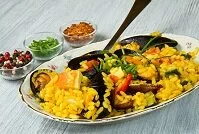Dining Etiquette

Paella
A meal with the Spanish can be an event that includes eating, drinking, dancing, and entertainment so be prepared for a number of festivities and don't make plans for the rest of the evening. If you get invited into a local's home be sure to bring a gift, like chocolates, cake, or wine.
Once you arrive 15-30 minutes late, get past the gift giving, shake everyone's hand (including women and children), and you're shown your seat most of the formalities are done. The purpose of dining is to socialize so focus on this as many of the dining rules are similar to the rest of Europe. These similarities include not eating until your host does, keeping your hands within sight during the meal, and eating in the continental style (knife in the right hand, fork in the left), but when a knife is not needed, many Spaniards will use the fork in the right hand and have bread in the left to push food onto the fork. If you happen to be the guest of honor you may also be asked to give a toast, but let the host lead this.
As you finish your food, eat everything on your plate as leaving anything is somewhat rude and viewed as wasteful. Fortunately, the Spanish are more forgiving of picky eaters than most and turning down a dish that does not appeal to you will generally be accepted. After the meal be prepared for music and dancing; although this isn't a rule, in many restaurants it is common, especially after a late dinner and most dinners in Spain begin between 9:00 and 11:00 pm.
Another thing to remember if you're dining out is that the inviter generally pays for everyone and if you're traveling solo, eating alone in a restaurant for dinner is viewed as very strange so try to make a friend.
Tipping is not common in Spain, although rounding your bill up is generally appreciated and not entirely uncommon among the locals. Unless you are in a tourist restaurant that is used to foreigners, leaving no tip is normal; in restaurants catered to foreigners, the wait staff does expect tips, but again it is not necessary.
Drinks
Spain has a large variety of non-alcoholic drinks including one of the most popular, coffee, but also has soft drinks, tea, juices, and milk. For a more local flavor, try solares, which is very popular, or any of the local carbonated drinks, which include mineral water and citrus sodas.
When it comes to alcohol, Spain is known for its local wines and this tends to be the most commonly drank alcoholic beverage as well. The wines in Spain are served in numerous styles and various settings. Sherry is a strong fortified wine that is to be slowly sipped while sangria is a combination of wine with fruits and sometimes mineral water. Calimocho is wine mixed with Coke and is not as popular, but is interesting and worth a try for the wine and Coke fanatic. Mixed drinks, like the pina colada, and beer are also popular in Spain.
Generally speaking, the tap water is safe to drink in Spain, but check with locals for any particular regional differences. Also, many people may have troubles adjusting to the local tap water, as it will most certainly be different from what your system is used to.